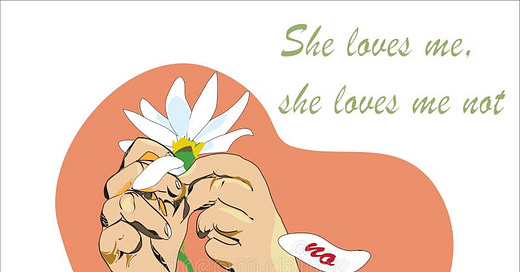In August 2022, I joined a martial arts gym in my hometown and was partnered with a 31-year-old half-white and half-Cuban guy named Noa during my first class. We instantly hit it off and became particularly close friends after knowing each other for about a month. We texted each other multiple times a day, regularly went on shirtless runs downtown, and would be there for each other when we were dealing with intimate issues.
Then, about one year later, he suddenly stopped being available to hang out and stopped initiating text messages. Part of me thought that he no longer liked me, but I suppressed that belief because he would always respond to my texts in a normal manner.
However, in spite of my best efforts at ignoring my gut instinct, I couldn’t help but think that something wasn’t quite right because he was sending mixed signals: On the one hand, he would respond to my text messages within a reasonable amount of time and message me like normal, but, on the other hand, he never wanted to hang out.
I say that Noa “suddenly” no longer wanted to hang out, but I deduced (well, took my best guess) that he stopped wanting to spend time together due to my tendency to dwell on negative things every time we interacted.
Noa was a particularly forward guy, so I straight up asked him if he no longer liked me as much as before because of how depressing I was to be around. He assured me otherwise, and claimed that he hadn’t been able to hang out due to some personal problems he was dealing with. I still didn’t completely believe him, because, at the end of the day, a real friend is going to want to spend time together and check up on you; however, instead of trusting my gut, I took what he said at face value and continued texting him like normal. And, as I suspected, he continued to make excuses every time I asked him to hang out.
I concluded that our friendship was over at this point, so I stopped reaching out because I wanted to maintain my self respect. An entire year has passed and he has not reached out.
This summer, as I was walking shirtless downtown , I had an epiphany: He never sent me a single mixed signal – in fact, there was nothing nebulous about his message at all – he was just indirectly communicating the type of relationship he wanted with me the entire time.
People Don’t Like Conflict
People don’t like conflict. This may seem obvious, but have you ever stopped and thought about the lengths people are willing to go to avoid it?
People now ghost the person they’ve been dating instead of telling them that they no longer wish to pursue a relationship, engage in passive aggressive behavior to convey their frustration with someone instead of directly saying what’s wrong, communicate with one another using indirect and hazy language to avoid offending someone, and, in the case of my former friend Noa, continue talking to you despite no longer liking you. It literally seems like people would rather jump into an olympic sized swimming pool full of rusty thumbtacks than engage in direct confrontation.
Now, while it’s easy for me to sit here and write about how pathetic it is for people to be fearful of conflict, there are valid reasons for it. In our ancestors’ evolutionary past hundreds of thousands of years ago, conflicting with tribe members could have resulted in death. Moreover, men and women are no longer learning more traditionally masculine skills - like how to handle conflict - because fathers aren’t as present in the household as they were pre industrial revolution. As such, both men and women alike, whether through propensity or an evolutionarily evolved adaptation, tend to do whatever possible to avoid confrontation, including sending mixed signals.
Mixed Signals
Mixed signals are incongruences in a person’s behavior. More specifically, when there is a deviation in a pattern or expected behavior. This is most notable when someone’s words don't align with their actions, or when someone’s actions or attitudes towards something or someone is inconsistent. People who send mixed signals tend to drive those on the receiving end crazy, especially as it pertains to romantic interests, because of the lack of closure doing so produces; oftentimes, you’d like to get to the bottom of why the person you were cool with is acting weird all of a sudden.
With that being said, as I was evaluating my friendship with Noa, I began to scrutinize other occurrences in which people sent me “mixed” signals, and my belief that they don’t exist was reaffirmed.
Mixed Signals Don’t Exist
You see, the “mixed” signal is the message – it’s an accurate reflection of how someone feels about you – there’s nothing mixed about it.
Noa continuing to respond to my text messages like normal despite no longer initiating contact or hanging out with me was an indication that he liked me enough to speak to me when I would text him first, but not enough to initiate conversation or hang out. There’s nothing mixed about that.
When you conclude that someone is sending you mixed signals, always trust someone’s behavior more than the literal words that come out of their mouth. Words lie but actions usually don’t. Again - people are conflict averse and will seldom tell you their sincere feelings to avoid it.
Behavior Is a True Indication of How Someone Feels
While mixed signals can be experienced in any facet of life, they are most prevalent and experienced in romantic relationships. Here, the adage “Actions speak louder than words” is a general truth that should be internalized.
So, when someone replies to your text messages with one word responses or emojis only, that suggests they like you enough to acknowledge your existence, but yield no interest in having any sort of relationship with you. They’d probably like to ghost you, but aren’t going to because doing so would be rude. In essence, they like you enough to send you a one word response.
While an evaluation of the ways in which people send mixed signals is out of this essay’s scope, I would be remiss if I didn’t address the most revealing of all: incongruence amongst an individual’s words, vocal tonality, and body language.
If you’ve ever had a conversation with someone and felt like something wasn't quite right, it was likely your subconscious mind communicating to your conscious mind that a deviation from an anticipated behavior occurred. Your brain was making a mental note that the words coming out of the person’s mouth were not in alignment with their body language or tonality.
Our ancestors couldn’t speak when they first evolved into homo sapiens over two hundred thousand years ago, so they communicated with one another using their bodies and other nonverbal cues until they could. And because most communication throughout history has been nonverbal, people’s sub communications and gestures are a more accurate reflection of their true feelings in most situations.
Thus, if someone’s words, actions, and tonality are not in alignment, always be most critical of the words said because they, by themselves, are not always an accurate reflection of how one feels.
For instance, if you’re in a conversation with someone and notice that their body, especially their feet, is oriented away from you (and remains that way), they probably don’t want to talk to you- even if they seem to be enjoying themselves. When someone’s body language conveys one thing and their words convey another, they’re not sending you mixed signals, they’re just indirectly conveying that they would rather interact with or go towards wherever their body is oriented. Just think: If someone doesn’t like you or doesn’t want to talk to you, they aren’t just going to walk away; that’d be incredibly rude.
Unless the person in question is me. I’d have no problem doing that.
Lastly, when someone replies to a question in a tone that lacks confidence, like answering a yes or no question with a delayed and prolonged “sure”, they don’t actually want to do whatever was proposed. But, instead of simply letting you know like a normal person, they are hoping you take the hint and ask them if they’re certain because people would rather do that than engage in conflict. This is normally the point where they divulge their true feelings and hope you are understanding of them not wanting to do whatever was asked. Again, there are no mixed signals here. The words, more specifically, how they are said, are the signal.
The next time you suspect that someone is sending you mixed signals, rationally evaluate (with your newfound understanding of human nature) what they’re doing, and you will likely find that the message they’re sending isn’t so unclear after all. Instead of fretting over these signals and concerning yourself with why the individual is behaving in such a manner, just accept the situation for what it is, and move on. Remember that people hate conflict and will avoid it like the covid vaccine, so never expect people to overtly tell you how they truly feel.
If you are fortunate enough to encounter such a unicorn - well, after you’ve ascertained that they aren’t berating you, that is, consider yourself lucky, because encountering and befriending such individuals is rare.







Good read.
Couple friends where I put the effort in. I try to check in just to let them know I’m thinking of them these few I don’t need reciprocation, if I don’t check in I worry they might not be well. It’s more selfishly for me.
Usually tho with most people & dates I match energy!! It’s served me pretty good, asking questions like u did is also important. I have no problem someone telling me they don’t really wanna hang or like my company. I am getting better at being blunt myself, as ghosting is what is rude, it is the confrontation imo.